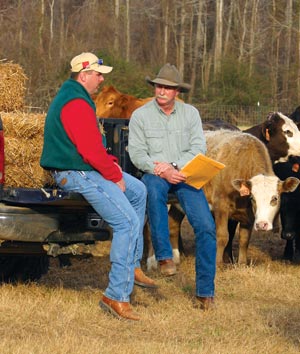Brand Your Farm – Alabama Implements Premises Identification As Part of National Animal Identification System

State officials are encouraging Alabama livestock owners to participate in the newly implemented National Animal Identification System (NAIS) by identifying and registering premises that are associated with animal agriculture.The premises registration system in Alabama is directed by State Veterinarian Tony Frazier and recently was announced by Alabama Agriculture Commissioner Ron Sparks.Dr. Frazier said there is a lot of confusion about the premises registration program. He said it’s important for those who own, house or handle livestock to know the program is strictly voluntary at this time, but added that he would like to see everyone participate in the program.”The premises registration program defines the physical, geographical location where livestock are kept, housed, fed, assembled, cared for or exhibited,” Dr. Frazier said. “That includes farmers but also includes veterinarian offices, stockyards and feed lots.”The U.S. Department of Agriculture has made the implementation of the NAIS one of its top priorities. When fully operational, the NAIS will be capable of tracing a sick animal or group of animals back to the herd or premises that is the most likely source of infection. This would only be the case with reportable diseases such as foot and mouth disease and bovine spongiform encephalopathy. The system also will be able to trace potentially exposed animals that were moved out from that herd or premises. The sooner animal health officials can identify infected and exposed animals and premises, the sooner they can contain the disease and stop its spread.The NAIS is driven by several factors, according to Dr. Frazier. “Consumers want to know where their meat is produced and that it’s safe, wholesome and comes from a U.S. producer,” he said. “We need to be able to quickly trace an animal disease that could have occurred accidentally or intentionally through an act of terrorism. And we need this system in place to be able to assure our export markets that we can respond and recover quickly.”According to the Alabama Agricultural Statistics Service, Alabama has an estimated 45,000 premises, but Dr. Frazier believes the number is probably higher. He said “who” should participate also is often misunderstood.”There’s been a misconception by some people that this is a program just for cattle,” Dr. Frazier said. “It actually includes all livestock including cattle, bison, swine, sheep, goats, poultry, equine, deer, elk, llama and emu.”Farmers and others who qualify for participation in the premises registration program may obtain a NAIS Premises Registration Form from the Alabama Department of Agriculture and Industries at P.O. Box 3336, Montgomery, AL 36109-0336. Contact the department by phone at (334) 240-7253. The forms may be downloaded from the department’s website at www.agi.state.al.us, and state officials hope to eventually have on-line registration for premises ID.When a farm or business premises is registered with the Alabama Department of Agriculture and Industries, it will be entered into the USDA National Premises Allocation system where it will be assigned a number. A landowner or business may have several premises registrations, and each will be entered individually and assigned a separate number. The form also includes what type of livestock is housed on the premises and what type of operation is at the location. Farmers will not be asked to individually tag their animals nor will they be asked any financial questions, Frazier said. Once a premises form is processed, a confirmation letter containing the applicant’s account number and premises number will be mailed to him.Perry Mobley, director of the Alabama Farmers Federation’s Beef Division and Meat Goat & Sheep Division, said all responsible livestock owners should be eager to participate.”This program definitely is a good first step in allowing us to trace animals,” Mobley said. “While it could define where a disease occurred, by defining the location, it can help eliminate speculation about a potential outbreak. The important thing to remember is that premises registration is voluntary, it’s easy and it’s free.”Identification programs already are in use by some producers and performance management groups, Mobley said. The Alabama Beef Connection distributes unique radio frequency identification tags for use in cattle that allow producers to track their cattle from birth. That system provides carcass information that assists producers in making genetic management decisions. When a radio frequency identification and tracking system like the Alabama Beef Connection is tied to a premises system, it provides a complete animal tracking system that is expected to be eventually implemented by USDA.Frazier said he anticipates that a more complete identification system will be in place through USDA in a couple of years. Exactly what method of individual animal identification will be used hasn’t been decided, he said. “As technology improves and the ability to collect information and use it continues, so will the development of the program,” he said.
